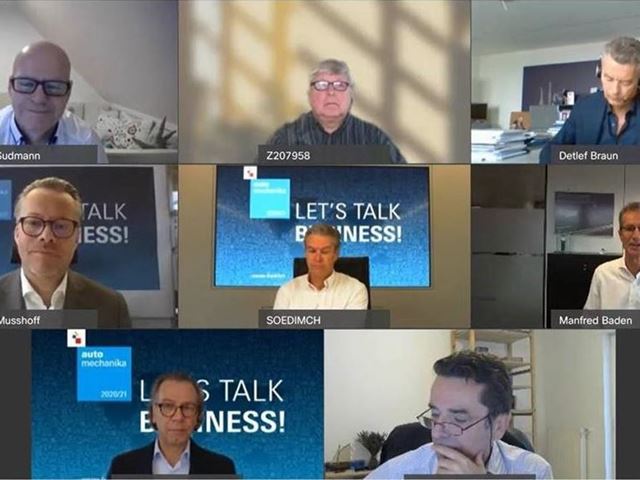The first Automechanika talk: The impact of the coronavirus on the aftermarket

Frankfurt am Main, 6 November 2020. The new ‘Automechanika – Let’s talk business’ series of talks brings together key international players, associations and supporters from the automotive aftermarket to discuss pressing topics. The first talk took place on 30 October as a digital event on the topic of the coronavirus and its impact on the automotive aftermarket.
In the first web talk, leading international suppliers exchanged views on the coronavirus’ impact on the aftermarket and the challenges it poses for supply chains. The following guests took part in the discussion: Manfred Baden, President Automotive Aftermarket Robert Bosch GmbH, Rolf Sudmann, Executive Vice President ContiTech, Jean‑Francois Bouveyron, Vice President Aftermarket EMEA Delphi Technologies Aftermarket, Michael Söding, CEO Automotive Aftermarket Schaeffler AG, and Helmut Ernst, Senior Vice President Aftermarket ZF AG.
As the talk made clear, neither the automotive industry nor its suppliers were prepared for the coronavirus pandemic. “We are experiencing what is probably a once-in-a-lifetime crisis. […] And we have been on a roller-coaster for a number of months now,” confirmed Jean-Francois Bouveyron, Vice President Aftermarket EMEA Delphi Technologies Aftermarket, adding that: “Business declined dramatically in March, but it recovered significantly in summertime. To me, this demonstrated the resilience of the aftermarket, and it showed that it was able to do a far better job of coping with the crisis than the OE market could, for example.”
Rolf Sudmann, Executive Vice President ContiTech, also addressed this issue: “Like many parts manufacturers, we have to manage supply chains with a high international complexity. To be honest, this far-flung system was not very resilient during the spring when we were all facing the coronavirus crisis for the first time.” In some cases, production was shut down, and companies were confronted with the challenge of dealing with rising (often unscheduled) orders.
Following the first quarter, however, the supplier industry began a slow recovery, and companies learned a great deal from the situation that resulted from the coronavirus pandemic and global lockdown. Rolf Sudmann had this to say: “We have used the time to improve our supply chain management and the processes within the supply chain. Furthermore, we have strengthened our collaboration with many of our international partners, especially in that fields of digitalisation and forecasting. That is why I am confident about the future.”
Bosch’s supply chains were relatively stable, and the company is benefiting from this in the current situation as well: “Despite this difficult situation, we at Bosch managed to maintain our supply chains over the entire period, which gave us a very good basis for the ramp-up over the past few months. Today we can say that demand has improved markedly in almost all aftermarket product areas,” stated Manfred Baden, President Automotive Aftermarket Robert Bosch GmbH.
Participants in the talk were also in agreement that a sophisticated crisis management system is essential. In the words of Michael Söding, CEO Automotive Aftermarket Schaeffler AG: “Establishing an effective crisis management system is the key.” Everything possible must be done to prevent the shutdown of production and logistics on account of coronavirus infections amongst the workforce. “We have to focus on the health and safety of all our associates,” added Michael Söding. The panel was also keen to point out that close contacts and dialogue with customers are extremely important for improving forecasting and reacting quickly and flexibly to changing situations. Helmut Ernst, Senior Vice President Aftermarket ZF AG, made it clear that COVID-19 has acted to further accelerate the consolidation process in the industry: “COVID-19 in combination with electric mobility and a shortage of funds have really propelled the consolidation process.”
With the situation as it is right now, no one wanted to venture any predictions about the future. Manfred Baden: “With coronavirus numbers rising again all over the world, it’s not possible to make a forecast. We have to keep a close eye on the situation, so that we will be able to react quickly when the need arises. Jean-Francois Bouveyron is of the same opinion: “The situation forces us to be extremely agile. We are being confronted with a second wave, and there is huge uncertainty about the end of the year.”


The video of the talk offers many more fascinating insights and trends, and is available in English online at www.automechanika.com/lets-talk-business.
Press information and photographic material:
Links to websites:
facebook.com/automechanika I twitter.com/automechanika_
linkedin.com/showcase/automechanikafrankfurt I instagram.com/automechanika_official




